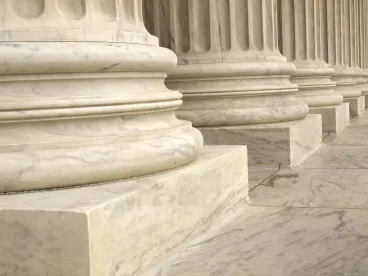On April 14, 2023, in a decision involving appeals regarding two separate agency enforcement actions, the Supreme Court unanimously held that respondents in such actions may raise certain constitutional challenges outside of the administrative proceedings. Axon Enterprise, Inc. v. Federal Trade Commission.
In the Axon case, the FTC brought an administrative enforcement action against Axon challenging its acquisition of its closest competitor. The second case, Securities and Exchange Commission v. Michelle Cochran, involved an SEC enforcement action alleging that Cochran violated auditing standards.
Writing for the Court, Justice Kagan noted that an administrative proceeding typically involves an initial adjudication by an Administrative Law Judge (“ALJ”). The ALJ’s decision is subject to review by the agency and the agency’s final decision is subject to review by a court of appeals. However, the cases before the Court did not follow the typical course. Rather, in each case, the respondent sued in district court seeking to enjoin the Commission’s proceeding charging that a fundamental aspect of the Commission’s structure violates the Constitution. In each case, the respondent asserted that the special tenure protection granted ALJs by the applicable statute so insulated them from presidential supervision as to violate the Constitution’s separation of powers provisions. In addition, Axon claimed that the FTC Act’s combination of prosecutorial and adjudicative functions in the FTC renders all of its enforcement actions unconstitutional.
In each case, the district court dismissed the suit for lack of jurisdiction. On appeal in the Axon case, the Court of Appeals for the Ninth Circuit affirmed the district court’s decision. However, in Cochran, the en banc Fifth Circuit reversed, ruling that “Cochran’s removal power claim is not the type of claim Congress intended to funnel through the Exchange Act’s statutory review scheme.” 20F. 46h 194, 212 (2021).
In agreeing with the Fifth Circuit, Justice Kagan noted that a special statutory review scheme, such as those set forth in the Securities and Exchange Act and the FTC Act, may preclude district courts from exercising jurisdiction over challenges to federal agency action. But such a review scheme does not necessarily extend to every claim concerning agency action. The key question is whether the particular claims were of the type Congress intended to be reviewed within the statutory scheme.
The Court cited to its decision in Thunder Basin Coal Co. v. Reich, 510 U.S. 200 (1994), which identified three factors to aid in that inquiry. First, could precluding district court jurisdiction foreclose all meaningful judicial review of the claim? Second, is the claim wholly collateral to the statute’s review provisions? Third, is the claim outside the agency’s expertise?
The Court answered all three Thunder Basin questions in the affirmative. Noting that the application of the first factor was the least straightforward, the Court held that subjecting respondents to the administrative proceeding would foreclose meaningful judicial review because the alleged harm is being subjected to unconstitutionally structured proceedings, which cannot be remedied after the proceedings are over. Similarly, the claim is collateral to the statutory review provisions because the challenge is to the Commissions’ power to proceed at all, not to any action taken in the proceedings. As to the third question, the Court had no hesitancy in determining that the constitutional questions were outside the expertise of both the SEC and FTC.
Axon and Cochran are now free to pursue their respective constitutional challenges in court, rather than as part of agency administrative proceedings. It remains to be seen whether the Court’s decision will result in an increase in collateral attacks on agencies’ structures and proceedings outside of the particular agency’s special statutory scheme, and how receptive courts will be to such attacks.





 />i
/>i

